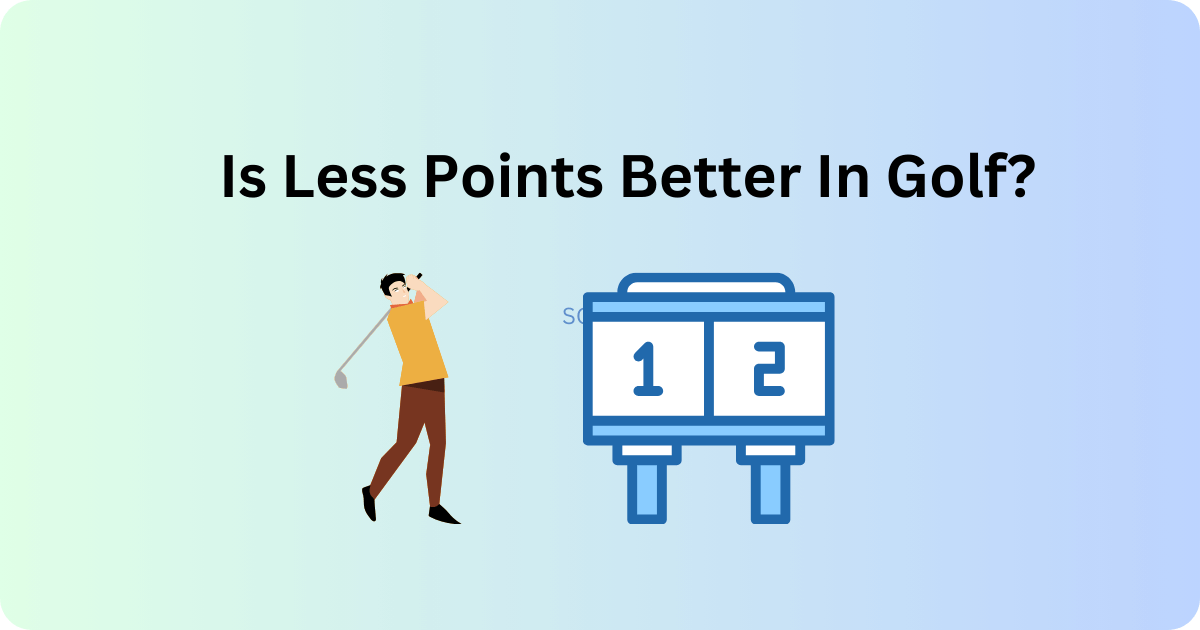When it comes to golf, the age-old question that often pops into the minds of both amateurs and seasoned pros is, “Is less points better in golf?” This query is more than just a casual thought. It is a fundamental aspect that can shape how players approach their game. In this blog post, we will dive deep into the intricacies of scoring in golf and explore whether having fewer points makes you a better golfer.
Understanding Golf Scoring
The Basics of Golf Scoring
Golf scoring can be confusing at first glance. Unlike most sports, where the objective is to score more points than the opponent, golf operates on a different premise. In golf, lower scores are better. This means that a golfer aims to complete a round in as few strokes as possible. But why is this the case?
Par: The Standard
Every golf course has a “Par” — a predetermined number of strokes an expert golfer must take to complete the course. For instance, if a course has a par of 72, an average golfer might aim to finish with a score of 80 or less. However, if you finish with a score of 70, you’ve technically played better than par, which is a fantastic achievement!
The Importance of Why Less Points Better In Golf
Mental Game
Why is having fewer points so crucial in golf? The mental aspect of golf can’t be overstated. Every stroke counts, and the pressure of maintaining a low score can lead to anxiety. Imagine standing on the 18th hole, knowing you need just one more stroke to achieve your personal best. The tension is palpable, and the stakes feel higher than ever.
Strategy and Skill
Having fewer points also reflects a player’s skill level. It requires a combination of strategy, precision, and experience. A golfer who consistently plays under par demonstrates a deep understanding of the game and the ability to execute shots effectively under various conditions.
Common Misconceptions
“More Points Equals More Fun”
Some players argue that accumulating more points can be more enjoyable. However, this perspective must often be revised to understand the game’s true nature. While hitting a long drive or sinking a challenging putt is fun, the ultimate satisfaction comes from mastering the course and achieving a lower score.
The Social Aspect
Golf is often seen as a social sport. Friends gather, share laughs, and enjoy the day out on the course. But remember, striving for fewer points can enhance the experience even within this social context. It can lead to friendly competition and a sense of accomplishment.
Conclusion
So, are fewer points better in golf? Absolutely! Striving for fewer points improves your skill and enhances your enjoyment of the game. As you continue your golfing journey, remember that each stroke counts and that improvement is gradual. Embrace the challenge, enjoy the game, and aim for that elusive lower score!
FAQs
What does it mean to score below par in golf?
Scoring below par means completing the course in fewer strokes than the predetermined par, indicating a better performance.
How is golf scoring different from other sports?
Unlike most sports, where the goal is to score more points than the opponent, in golf, the objective is to have a lower score.
What is considered a good golf score?
A good golf score typically depends on the course’s par; shooting par or below is considered excellent for most golfers.
Why do golfers keep track of their scores?
Tracking scores helps golfers monitor their progress, identify areas for improvement, and set goals for future rounds.
Does practicing lower scores improve your game?
Yes, focusing on achieving lower scores can enhance a golfer’s skills and strategies, leading to overall better performance on the course.

James Smith is the author of a website called Golf Mentally. He believes that golf is as much about thinking as it is about swinging the club.
Golf Mentally helps golfers of all levels. It teaches new golfers the basics, like how to hold the club and hit the ball. It also helps more experienced golfers learn new things and improve their game.
James wants to help golfers think smart on the course, not just hit the ball hard. He believes that by thinking about your shots and staying positive, you can play much better golf.

